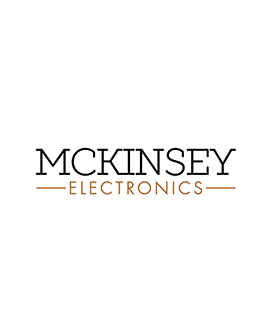

[Sponsored] Emerging markets are no longer watching the global technology race from the sidelines. They are participating in it, shaping it and setting new priorities for how systems are designed, deployed and supported. For South Africa’s engineering community, this shift is becoming increasingly visible across sectors.
Whether through state-backed clean energy initiatives, expanding defence capabilities or investment in EV infrastructure, the country is aligning itself with a broader technological future. However, the systems behind that future still depend on one thing: components.
The Semicon Summit 2025 in Dubai offers a rare opportunity to be part of that conversation from the inside. Hosted by McKinsey Electronics, the two-day summit takes place 9 - 10 December 2025 at the Sofitel The Obelisk hotel Dubai; one event, one place and one platform where engineers, sourcing teams, technical strategists and policymakers can sit at the table with the world’s leading semiconductor manufacturers. It is a working summit for technical alignment, supply chain strategy and shared engineering progress.
A summit built for the region
While many technology events are designed for global audiences, the Semicon Summit 2025 is engineered specifically for the Middle East, Africa and Türkiye, regions that share similarities in market growth trajectories, infrastructure challenges and sourcing realities.
The agenda blends product previews, technology roadmaps, system-level demonstrations and one-on-one technical meetings. For South African attendees, this creates a structured, high-value environment to address sourcing challenges, verify product roadmaps and establish partnerships that support long-term system development across the continent.
Confirmed manufacturers include ams OSRAM, Amphenol, Energizer, Epson, STMicroelectronics, Würth Elektronik and many more. Each bringing their FAEs, roadmap leads and product engineers, thus ensuring discussions happen at the technical decision-making level, not just on the show floor.
From specification to solution
Too often, events in the semiconductor space lean into the promotional. Booths are built, demos are staged, specifications are shared, but the link to local engineering needs is missing.
The Semicon Summit 2025 moves differently. The format is grounded in engineering workflow, thereby moving from requirements to solutions in real time. Attendees can:
• Compare competing technologies side-by-side with the engineers who designed them.
• Ask direct design-stage questions to clarify feasibility, compliance and integration.
• Validate availability and lead times before committing to a design.
For many South African design teams, especially those in energy, mining, telecom, mobility, and industrial automation, this access is crucial. Global sourcing remains unpredictable and design changes late in the cycle can be costly. Having answers direct from the source reduces requalification risk and accelerates project timelines.
‘The Conversations That Count for South Africa’s Future’ - The summit’s sessions are built around application-specific and region-relevant themes, including:
• AI integration and hardware optimisation.
• Electric vehicles & mobility electronics.
• Industrial IoT & connectivity in remote environments.
• Defence and aerospace systems designed for rugged operation.
• Smart energy & sustainability solutions under constrained logistics.
These topics reflect active regional programs, including the UAE’s Vision 2031 and Operation 300bn industrial strategy, and African initiatives in renewable energy deployment, EV adoption, and defence technology manufacturing.
Systems thinking, not just components
While components are the building blocks, the summit also addresses system-level challenges. Breakout sessions and group discussions will explore:
• Ruggedised electronics for infrastructure deployment.
• Sourcing strategies in volatile markets.
• Power systems integration in resource-constrained settings.
Hearing how peers in the Middle East or Türkiye are tackling similar challenges allows South African teams to adapt proven strategies while contributing their own expertise.
Networking as a core deliverable
Networking is not an afterthought here, it is rather structured into the summit’s format. Confirmed participants include engineers and technical leads from Middle Eastern giants like Aramco, Edge Group, Ceer Motors and STC, alongside public-sector innovation authorities.
For South African procurement teams sourcing modules for EV designs, R&D; leads prototyping defence-grade systems, or consultants evaluating readiness for public-sector infrastructure, face-to-face engagement with regional counterparts is a value multiplier. These are conversations that go beyond introductions; they are working sessions to explore shared supply sources, compatible specification, and design methodologies.
One-on-one technical meetings
Perhaps the most distinctive feature is the pre-scheduled one-on-one meeting program. Manufacturers are not there to showcase static displays; they are prepared to:
• Review schematics and block diagrams.
• Discuss selection criteria in detail.
• Explore integration trade-offs and roadmap alignment.
These sessions are especially valuable for teams working in safety-critical systems where early validation is essential. Many of these conversations cannot happen over email or through distribution portals, they require face-to-face exchange and open technical dialogue.
Why South Africa should be in the room
McKinsey Electronics, as host, understands South Africa’s unique operating environment, from extended supply chains and compliance requirements to climate and infrastructure realities.
If you are in engineering, sourcing, or strategic technology planning, this summit offers:
• Direct access to 20+ top-tier manufacturers.
• Engineering-first conversations with FAEs and technical leads.
• Exposure to roadmaps and application-specific demos not yet available online.
• Networking with decision-makers shaping projects across the Middle East, Africa, and Türkiye.
For leadership in both private and public sectors, there is also strategic value; clarity on which technologies are maturing, which suppliers are credible, and which implementation models are working in comparable markets.
The path forward
The future of South Africa’s technology ecosystem depends on deeper integration with global supply chains and tighter alignment with semiconductor manufacturers. That alignment cannot be achieved through datasheets alone. It takes presence, interaction, and shared focus on real systems.
The Semicon Summit 2025 is exactly that: one event, one platform, one place to move your next project forward.
Attendance is free for qualified industry professionals. Registration is now open.
Register now at mckinsey-electronics.com/semicon-summit-2025-in-dubai
For more information visit McKinsey Electronics,

© Technews Publishing (Pty) Ltd | All Rights Reserved